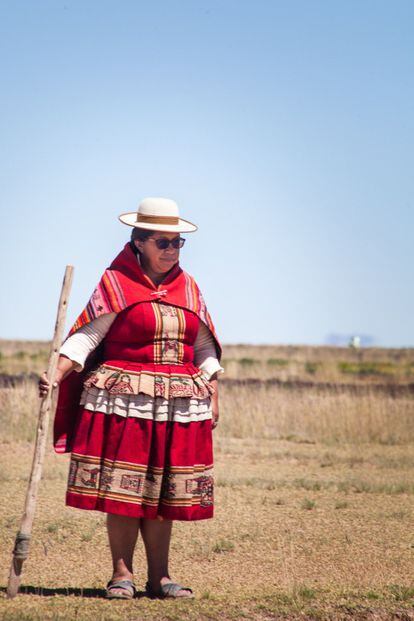The life of Trigidia Jiménez has always been bound to the countryside.
Contact with the earth, with the sun and nature: that is her thing.
Her first memories of agriculture de ella come from her father de ella, who instilled his love for food production in her de ella when they lived in Mina San José, in Oruro, Bolivia, where they used to plant potatoes.
Consequently, the first time someone put a cañahua seed in the palm of her hand, she felt an immediate connection: “It's a bit complicated to explain;
it's as if an electric current passed through me.”
It was love at first sight.
Now, 20 years later, thanks to a combination of scientific and ancestral knowledge, the Bolivian agricultural engineer has become an international reference for her work de ella in the production,
Thanks to a high resilience to climate change, droughts and floods without losing its productive capacity, cañahua – a “cousin” of quinoa – is considered a smart crop.
Jiménez produces it at Granja Samiri, her enterprise de ella, located in the municipality of Toledo, in the Oruro department (southwestern Bolivia).
The agroecological conditions of this locality are very adverse, according to the engineer, due to the cold, the heavy soils and the air currents.
However, despite being such a tiny grain, it is powerful.
Each agricultural cycle, the “only purpose” of the cañahua, she explains, is to produce grain to feed us.
“Climate change will get worse in the future, with little rain and more cold.
These species that have a great adaptability to sudden changes are going to feed us,” Jiménez says.
When Jiménez began her relationship with Cañahua there was no market for this product, and the production took up half a hectare, enough for a family's annual consumption.
Two decades later, the crop has found a market in the breastfeeding subsidy received by Bolivian mothers, thanks to the 1,500 families that are in charge of producing the grain in 2,000 hectares.
This was largely the result of the steady work of the Quechua engineer to revalue the crop, not only in terms of primary production, but also in aspects like the transformation of the product and finding a market.
Bolivia's president, Luis Arce, greets Trigidia Jiménez.Courtesy
Last April, the 54-year-old engineer was recognized as one of the “Leaders of Rurality” of the Americas by the Inter-American Institute for Cooperation on Agriculture.
The award that she received, called “Soul of Rurality,” is part of an initiative to recognize the men and women who make a difference in the fields of the Americas, a key region for food and nutrition security and the environmental sustainability of the planet .
The achievements of recent years have allowed for the industrialization of cañahua so it can be consumed as flour, pito (precooked flour in Bolivia), energy bars, cookies, and soups, among other uses.
Granja Samiri, whose production area covers between 80 and 100 hectares, has been collaborating with the National Institute of Agricultural and Forestry Innovation for more than 10 years.
During this time, four ecotypes of Cañahua have been worked on, of which some varieties, such as Wila and Samiri, have already been released.
The grain is also produced in countries like Ecuador, Chile, and Peru.
Just in Bolivia there are more than 800 ecotypes.
The engineer is aware that there is still some way to go, and explains that, in order to tame and release a wild subspecies, six to seven agricultural cycles (sowing and harvesting, once a year) are needed to obtain a crop with a varietal purity of 99%.
“There is still a lot to work to be done on the ecotypes before they achieve and manifest their maximum genetic expression,” she points out.
One of the pillars of the success of Granja Samiri, according to Jiménez, was the fusion of ancestral and scientific knowledge, an essential combination to achieve a sustainable rural enterprise.
This brings to mind her in-laws de ella, whom she respects deeply and remembers fondly.
Both, with a “direct connection with nature” and an “exquisite” knowledge regarding Cañahua, taught her about the production and transformation processes.
“Universities can be very square.
They tell you that one has all the power to solve things.
My father-in-law taught me to respect and to ask Mother Earth for a good production, to respect the space that each living being has in the ecosystem, because each has a role and a purpose.
It is knowledge that must be recovered,” she says.
Bolivian agronomist Trigidia Jiménez.Courtesy
rural sexism
Nothing has been easy for Jiménez since she chose her career in the 1980s.
Her family de ella believed that agricultural engineering was exclusive for men, something very hard for a woman to face along with what was considered her duty de ella: to form a home.
Only her father supported her.
With Samiri Farm it was also very difficult to make people understand that a woman was capable of leading a company.
She says that her husband was her “her best partner,” but that, after his death due to Covid-19 two years ago, everyone thought that her business was going to perish.
“In rural areas, machismo is still going strong.
You can feel the doubts about your abilities and the contemplation.
What they did n't realize was that behind the image of my husband there was a woman who had been slowly building her dreams of her.
I took charge 100% and kept on pulling the cart with the support of my children,” she says.
Two or three years ago, Jiménez used to say that it was she who chose the cañahua so that they could write a story together.
But she was wrong: “I am convinced that [cañahua] chose me.”
She recalls that at that time she was a submissive woman who did not believe in herself, while now she can say that she is a “proudly Quechua woman, strong and powerful like the cañahua.”
“Cañahua has taught me to be a woman that can withstand the machismo in my family and my community, who can have very clear and concrete goals in life.
I have learned a lot from it.
Thanks to this crop I am a happy woman.”









